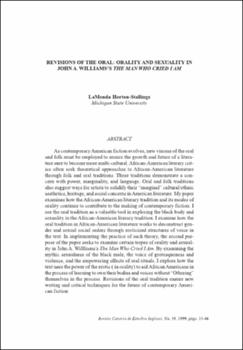Revisions of the Oral: Orality and Sexuality in John A. Williams's The Man Who Cried IAm
Fecha
1999Resumen
As contemporary American fiction evolves, new visions of the oral
and folk must be employed to ensure the growth and future of a literature
sure to become more multi-cultural. African-American literary critics
often seek theoretical approaches to African-American literature
through folk and oral traditions. These traditions demonstrate a concern
with power, marginality, and language. Oral and folk traditions
also suggest ways for artists to solidify their “marginal” cultural/ethnic
aesthetics, heritage, and social concerns in American literature. My paper
examines how the African-American literary tradition and its modes of
orality continue to contribute to the making of contemporary fiction. I
see the oral tradition as a valuable tool in exploring the black body and
sexuality in the African-American literary tradition. I examine how the
oral tradition in African-American literature works to deconstruct gender
and sexual social orders through eroticized structures of voice in
the text. In implementing the practice of such theory, the second purpose
of the paper seeks to examine certain tropes of orality and sexuality
in John A. Willliams’s The Man Who Cried I Am. By examining the
mythic sexualness of the black male, the voice of grotesqueness and
violence, and the empowering effects of oral rituals, I explore how the
text uses the power of the erotic ( in orality) to aid African Americans in
the process of learning to own their bodies and voices without “Othering”
themselves in the process. Revisions of the oral tradition ensure new
writing and critical techniques for the future of contemporary American
fiction.





